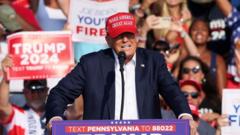Brazilian President Luiz Inácio Lula da Silva has firmly asserted that any tariffs imposed by the United States will be met with equivalent responses from Brazil, following President Donald Trump's alarming threat of a 50% levy on Brazilian goods effective August 1.
Brazil's Lula Challenges Trump's Tariff Threat Amid Needing Relations

Brazil's Lula Challenges Trump's Tariff Threat Amid Needing Relations
Brazil vows to reciprocate tariffs as tensions rise with the U.S. over Trump's 50% import tax threat.
In a pointed letter, Trump justified his decision by referencing Brazil's treatment of former President Jair Bolsonaro, who is currently facing legal challenges for alleged coup attempts after Lula's 2022 election victory. Trump referred to Bolsonaro as a “highly respected leader” and demanded an end to what he termed a “witch hunt” against him, alluding to the ongoing trials. This posture from Trump is consistent with their historically allied relationship.
Trump's earlier remarks condemned Brazil for handling Bolsonaro's situation, likening it to legal challenges he has encountered in the U.S. The proposed increase from a current 10% tariff to an extreme 50% could significantly impact Brazil, which depends heavily on trade with the U.S. as its second-largest trading partner, following China.
Responding strategically on social media platform X, Lula emphasized Brazil’s sovereignty and independence, announcing that “any unilateral tariff increases” from the U.S. would lead to corresponding tariffs from Brazil on American goods. Additionally, Lula refuted Trump's claims about the trade deficit, citing U.S. government figures that suggest a $7.4 billion trade surplus in favor of Brazil.
In addition to Brazil, Trump sent warning letters to 22 other countries, including Japan, South Korea, and Sri Lanka, regarding potential tariff hikes. However, Lula's letter was notably more politically charged, addressing not only trade but also criticisms related to Brazil's regulation of social media, which Trump claims involves “secret and unlawful censorship.”
Despite the precarious situation, some experts suggest that Trump's politically charged rhetoric could inadvertently bolster Lula’s domestic standing. Political scientist Rafael Cortez noted that leaders confronting Trump often see increased support domestically, suggesting a potential boost for Lula as he navigates this complex political landscape.
The outcome of this trade spat and its implications for U.S.-Brazilian relations remain to be seen, as both leaders prepare for an intense period of negotiation and political maneuvering.
Trump's earlier remarks condemned Brazil for handling Bolsonaro's situation, likening it to legal challenges he has encountered in the U.S. The proposed increase from a current 10% tariff to an extreme 50% could significantly impact Brazil, which depends heavily on trade with the U.S. as its second-largest trading partner, following China.
Responding strategically on social media platform X, Lula emphasized Brazil’s sovereignty and independence, announcing that “any unilateral tariff increases” from the U.S. would lead to corresponding tariffs from Brazil on American goods. Additionally, Lula refuted Trump's claims about the trade deficit, citing U.S. government figures that suggest a $7.4 billion trade surplus in favor of Brazil.
In addition to Brazil, Trump sent warning letters to 22 other countries, including Japan, South Korea, and Sri Lanka, regarding potential tariff hikes. However, Lula's letter was notably more politically charged, addressing not only trade but also criticisms related to Brazil's regulation of social media, which Trump claims involves “secret and unlawful censorship.”
Despite the precarious situation, some experts suggest that Trump's politically charged rhetoric could inadvertently bolster Lula’s domestic standing. Political scientist Rafael Cortez noted that leaders confronting Trump often see increased support domestically, suggesting a potential boost for Lula as he navigates this complex political landscape.
The outcome of this trade spat and its implications for U.S.-Brazilian relations remain to be seen, as both leaders prepare for an intense period of negotiation and political maneuvering.




















